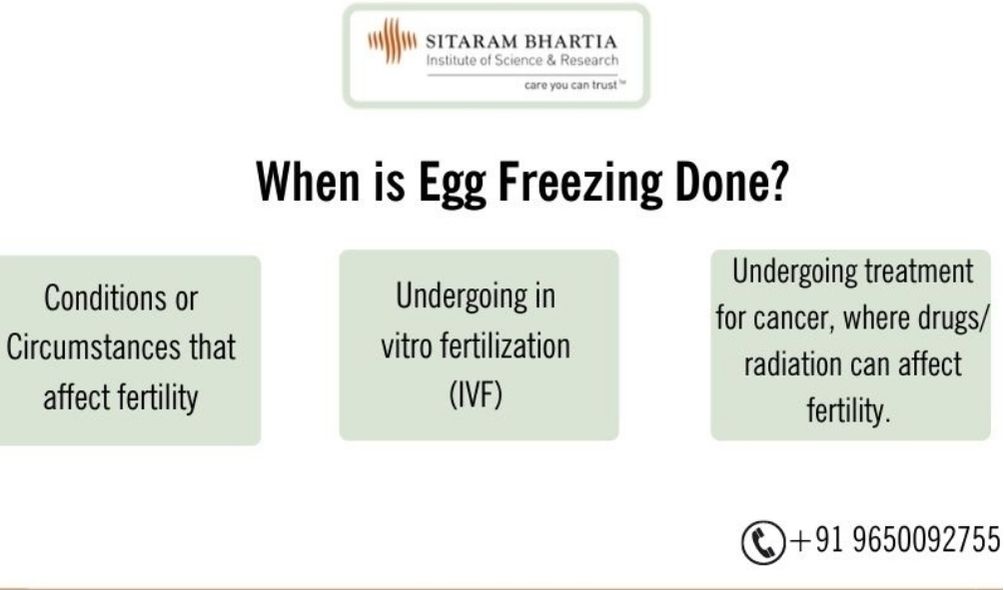Shreya Kapoor, 35, began considering egg freezing when a heart to heart chat with a friend helped her realize she wasn’t ready to settle down and start a family yet. While doing her research for hospitals that offered egg freezing services near her, she came across Sitaram Bhartia Hospital in South Delhi and Dr. Priti Arora Dhamija, Senior Fertility Expert, with 17 years of experience.
After reading up about the doctor, Shreya booked her appointment.
What is Egg Freezing?
Mature oocyte cryopreservation or egg freezing is a technique through which women can store their eggs or oocytes for use later in the future.
“Women may opt for egg freezing if they are undergoing cancer chemotherapy or otherwise are not yet ready to have children and want to preserve their eggs for use in the future,” says Dr. Priti.
The process of egg freezing in most cases is not painful and very safe, but some elements of the process can be considered uncomfortable.
What is the best age to freeze your eggs?
It is best to freeze your eggs when your ovaries are still young. This depends on various aspects including family genetics, family history and most importantly your lifestyle. The most preferable age group is from late 20s to early 30s.
Though there is no specific age limit, freezing eggs at 40 and beyond is generally not recommended due to low ovarian reserve and poor egg quality.

Shreya was keen on knowing the process before taking a decision.
What is the process of egg freezing?
The process of egg freezing involves the following steps:
Step 1: Ovarian Stimulation
You will be given injections to stimulate your ovaries to produce multiple eggs. This is done so that many eggs can be retrieved and consequently frozen. Experts suggest freezing a greater number of eggs with advancing age.
Step 2: Egg Retrieval
The next step is the oocyte/egg retrieval process, which is done 10-12 days after ovarian stimulation, by which time the follicles may have matured. The size and maturity of the follicles are monitored and assessed through follicular ultrasound scans.
The egg retrieval process involves the use of ultrasound. Once identified, the follicles are aspirated through a needle and contents are transferred to special containers. This process usually takes 15-20 minutes and is done under sedation/ anesthesia.
Step 3: Freezing
The unfertilized eggs are cooled to subzero for preservation, soon after retrieval. This process is called vitrification. The process involves rapid cooling to prevent the formation of ice crystals on the eggs.
With an understanding of the steps involved in the egg freezing process, Shreya wanted to know more.
How long can the eggs be stored?
Eggs can be frozen for many years together, but the duration for which they can be stored will vary with each hospital. At Sitaram Bhartia Hospital, we store eggs upto 10 years. However, if a patient is going for cancer treatment, her eggs can be stored beyond 10 years after requisite permission from the medical council.
How Will Eggs be Used in the Future?
The cryopreserved eggs are placed in a warming solution and assessed at the time of use. They are thawed under lab-controlled conditions and then fertilized with sperm collected from your partner or a donor.
A procedure known as Intra Cytoplasmic Sperm Injection (ICSI) has to be used in order to fertilize the cryopreserved eggs, because the cryopreserved eggs have a hard shell.
In this, a single sperm is inserted directly into each egg. The fertilized egg is monitored closely for 3-5 days following which the embryo is transferred into the uterus to achieve pregnancy after preparing the uterus with the use of some drugs (hormones).
Shreya proceeded to ask the doctor the steps she needed to take for the process.
How to Freeze Eggs: Tips for Preparation for Women
- Stop taking Hormonal Birth Control (oral pills or any hormonal contraceptive injections) You may be advised to stop taking hormonal birth control before starting treatment, as birth control drugs may affect the result of a fertility assessment and suppress the body’s response to medication used during the process of stimulation and egg freezing.
- Take Daily Injections You will be asked to get diagnostic tests done to assess your overall health. Once you get the green signal, your doctor will advise daily injectable medications starting from day 2 or 3 of your cycle, which will help the body mature multiple eggs for retrieval. In the following weeks, you will have to get follicular scans to check the growth of the follicles (fluids filled sacs that surround eggs) and blood tests to view changes in hormone levels. In case of cancer patients, hormonal injections are started even in mid cycle without any delay so that cancer treatment can be started at the earliest. These hormonal injections are short duration injections and do not impact cancer conditions. However, clearance from an oncologist is required.
- Get a Hormone Trigger Shot Your doctor will give you a hormone trigger shot when the follicles are ready that prompts the eggs to go through the final maturation stage. The trigger shot is given under short anesthesia so it is less painful and scarless. The doctor will then schedule the egg retrieval process to surgically procure your eggs. To use your frozen eggs later, you, your partner, or a gestational carrier will go through an IVF and embryo transfer cycle. So to ultimately have a baby, egg freezing is just part of the process; IVF is the next step.
How much does freezing your eggs cost?
The cost of egg freezing depends upon the age at which you opt for freezing, the duration of storage and other factors.
Effects after the Egg Retrieval Process
Some patients face the following short term problems after waking up from general anesthesia:
- Nausea
- Uneasiness
- Vomiting
- Dizziness
- Temporary state of confusion
- Feeling cold or shivering
Contact your doctor in case of:
- A fever higher than 101.5 F (38.6 C)
- Severe abdominal pain
- Weight gain of more than 2 pounds (0.9 kilograms) in 24 hours
- Heavy vaginal bleeding — filling more than two pads an hour
- Difficulty in urinating
What are the risks with Egg Freezing?
- Side effects with Fertility Drugs: Rarely, the use of injectable fertility drugs to induce ovulation may lead to swollen and painful ovaries after ovulation or egg retrieval. The signs and symptoms may include abdominal pain, bloating, nausea, vomiting and diarrhea.
- Egg Retrieval Complications: Though rare, the use of an aspirating needle to retrieve eggs may lead to internal bleeding, infection and damage to the bowel, bladder or a blood vessel.
- Emotional Risk: The procedure of egg freezing can provide hope for a future pregnancy but it is important to realize that there is no guarantee of success.
What determines Success Rates of Egg Freezing?
With the evolving vitrification techniques, the post warming results have improved.
The success of the egg freezing and thawing procedure depend on factors including:
- Age at the time of freezing the eggs
- Sperm quality
- Facilities at the clinic where you have frozen eggs
- The number of eggs
As studies suggest younger patients (<30) have better quality eggs as compared to patients with advanced age (>35).
Are There Effects on the Offspring Conceived from Thawed Oocytes?
There is limited data available on the effects of offspring born from frozen eggs. However, the available data comparing previously frozen eggs with fresh eggs has not shown an increased risk of congenital anomalies in the offspring.
Conclusion
After weighing the pros and cons of egg freezing and discussing it at length with her family, Shreya decided to proceed with it.
She was aware that there are no guaranteed outcomes, “ but I wanted to have the option of conceiving in the future, and I felt like it eased a little bit of the pressure on me.”

Medically Reviewed by Dr. Priti Arora Dhamija
MBBS, Maulana Azad Medical College, Delhi (1999); M.D, Lady Hardinge Medical College (2004); DNB Obstetrics & Gynecology (2004); Diploma in Pelvic Endoscopy, Kiel, Germany (2014)
Interests: Infertility and IVF, Pelvic Endoscopy
Experience: 17 years

Medically Reviewed by Dr. Sunesh Kumar
MBBS, Delhi University (1978)
MD Obstetrics & Gynecology, AIIMS (1981)
Experience: 40+ years
 Medically Reviewed by Dr. Pooja Awasthi
Medically Reviewed by Dr. Pooja Awasthi
M.Sc., Ph.D. (ongoing)
